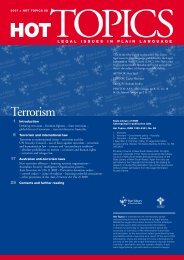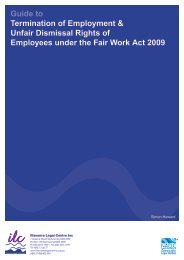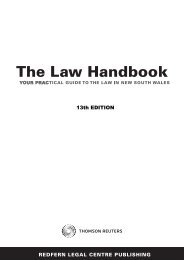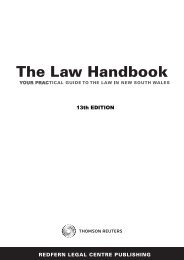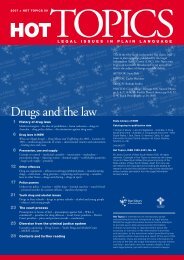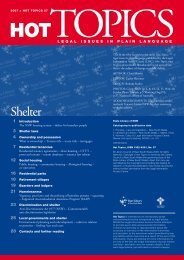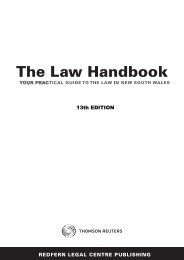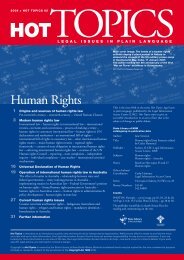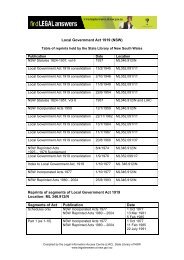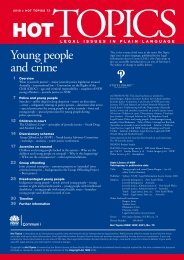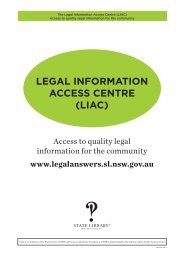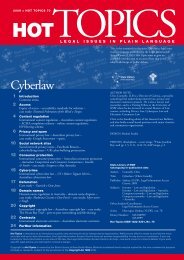Hot Topics 64 - Health and the Law - Legal Information Access Centre
Hot Topics 64 - Health and the Law - Legal Information Access Centre
Hot Topics 64 - Health and the Law - Legal Information Access Centre
Create successful ePaper yourself
Turn your PDF publications into a flip-book with our unique Google optimized e-Paper software.
found that artificial feeding was medical treatment<br />
<strong>and</strong> not <strong>the</strong> reasonable provision of food <strong>and</strong> water,<br />
under <strong>the</strong> Victorian legislation. Given <strong>the</strong> feeding was<br />
medical treatment, it could be refused under <strong>the</strong> Medical<br />
Treatment Act 1988 (Vic).<br />
Available at www.austlii.edu.au/au/cases/vic/VSC/2003/173.html<br />
Organ dOnaTiOn BY Brain-dead<br />
persOns<br />
In all Australian states <strong>and</strong> territories, legislation states<br />
that a person has died when <strong>the</strong>re has occurred:<br />
> irreversible cessation of all function of <strong>the</strong> brain of <strong>the</strong><br />
person;<br />
> irreversible cessation of circulation of blood in <strong>the</strong><br />
body of <strong>the</strong> person.<br />
See for example, <strong>the</strong> Human Tissue Act 1983 (NSW),<br />
section 33. Legislation also requires that a medical<br />
certificate must be completed for every death, even<br />
where <strong>the</strong> death has been reported to <strong>the</strong> Coroner. See<br />
for example <strong>the</strong> Births, Deaths <strong>and</strong> Marriages Registration<br />
Act 1995 (NSW).<br />
If a deceased person is shown, after reasonable inquiries<br />
to have agreed to organ donation during his or her life,<br />
written authorisation may be given by <strong>the</strong> designated<br />
officer of a hospital, or <strong>the</strong> senior available next of kin,<br />
for removal of such tissue. This will not apply if <strong>the</strong><br />
coroner needs to hold an inquest.<br />
Where a person is being kept alive by artificial ventilation<br />
<strong>and</strong> circulatory support, authority for organ donation<br />
cannot be given unless <strong>the</strong> patient has been declared<br />
brain dead independently by two medical practitioners,<br />
each with at least five years’ experience <strong>and</strong> one of whom<br />
is a specialist neurologist or neurosurgeon. The tests<br />
<strong>the</strong>se doctors perform include checking for absence of<br />
brain stem function through whe<strong>the</strong>r <strong>the</strong> pupils, or <strong>the</strong><br />
eyes in general, respond to pain, light or cold water in<br />
<strong>the</strong> ears; whe<strong>the</strong>r <strong>the</strong> patient has a gag reflex <strong>and</strong> tries to<br />
breath after being disconnected from <strong>the</strong> ventilator (<strong>the</strong><br />
blood’s rising carbon dioxide level will normally trigger<br />
<strong>the</strong> respiratory centre in <strong>the</strong> brain stem).<br />
The law operates on <strong>the</strong> principle that <strong>the</strong> views that<br />
a person expressed while alive about organ donation<br />
will be respected once he or she is dead. If <strong>the</strong> deceased<br />
person’s views are not known, it is left to <strong>the</strong> next of<br />
image u navailable<br />
A patient is attended to by an emergency medical team after being airlifted from <strong>the</strong> site of a collision between a passenger train<br />
<strong>and</strong> a semi-trailer near <strong>the</strong> country town of Kerang, in north-western Victoria, 5 June 2007.<br />
Wayne Taylor, The Age (Melbourne).<br />
End of life issues 17



